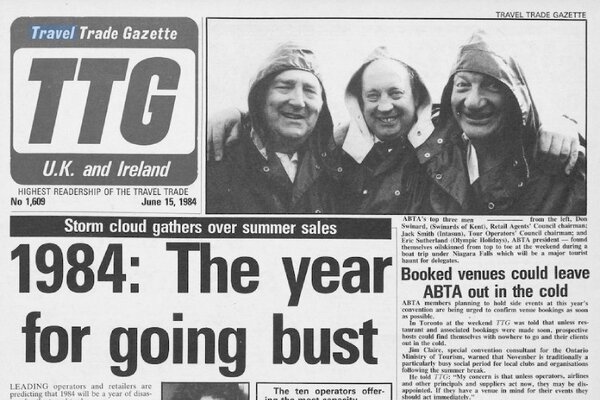TTG at 70: How travel's boom-bust nature came to be
 Gary Noakes
Gary NoakesThe 1980s began with a crisis for the industry as the price of oil spiked in the first few months of the decade due to surging global demand, leaving operators facing the prospect of having to break “no surcharge” guarantees or absorb 15-20% increases in costs.
Peak London-New York super Apex fares rose by £51.50 to £275 (equivalent to £1,080 today). British Airways warned £150 million in extra fuel costs meant it would be lucky to break even.
High oil prices brought recession and dampened demand, which led to the industry offering discounts to shift unsold packages. One agent luminary warned: “With extensive overcapacity, they are seriously undermining the price structure of the industry – and agents have just about had enough.”
Technology was also playing a more important role, with the boss of Thomson (now Tui) warning agents that by 1985, they “will either be using computers to give instant ticketing on package holidays, or they could be brochure distribution outlets for direct- sell operators”.
The industry, though, remained highly regulated, with operators allowed to control prices at which agents sold holidays. The 1980 Competition Act abolished this, allowing agents to discount. This prompted a backlash from operators, who threatened to cut commission from 10% to 5%.
The CAA then announced 15% of charter capacity from the UK regions could be made available to passengers without accommodation, despite Spain’s objections. However, it warned sales of these tickets on flights from London could see passengers turned back by special police units.
The decade also saw talks aimed at shaking up the restrictive UK-US air agreement, although unbeknown to anyone at the time, these were to rumble on for 20 years.
In 1982 Laker Airways’ Skytrain, the first budget transatlantic carrier, collapsed. Airline rivals, especially Pan Am, matched the fares offered by Freddie Laker, but TTG blamed him for forecasting exchange rates – and therefore costs – incorrectly. An opinion piece said: “If the pound was even 20 cents above its present $1.86, Sir Freddie’s company would hardly be buoyant, but it would at least still be in existence.”
The decade also saw the growth of the multiples. Thomas Cook revealed plans to open 100 new shops between 1984 and 1987, taking its network to nearly 400. TTG hailed the news as “yet another shock to small, independent agents finding it hard to compete with the technology and marketing muscle of the growing band of super-chains”.
Cook’s rival Thomson revealed its first long-haul programme in 1984, aiming to be second in size to Kuoni. The inaugural Virgin Atlantic flight also took place in the same year.
However, as recession continued, Intasun warned of “the worst year for the trade for a decade” in 1984 amid a flood of discounting to shift overcapacity estimated at one million packages.
Intasun, then carrying 550,000 passengers, was second behind Thomson at 1.27 million, with some blaming Intasun boss Harry Goodman for needlessly slashing margins when sales were buoyant. Goodman unashamedly announced ambitions to be the world’s biggest operator by 1987.
The decade also saw Airtours evolve from a one-branch travel agency in Lancashire. Its rapid growth attracted headlines for consolidating flights and misleading advertisements.
By 1987, five brands controlled 65% of the market, with Thomson commanding 30%. The industry was blamed for creating the “lager lout” culture, causing havoc in resorts. This led to countries like Greece clamping down on seat-only sales because of drunken behaviour.
The industry’s boom-bust nature was illustrated in 1986 when operators began adding capacity again, convinced consumer confidence had returned. But the decade ended with the big two agreeing a truce to end three years of discounting. Capacity was cut, and with inflation at 8%, prices were raised by 10% to stabilise the summer 1990 market.
What did it all mean?
The 1980s saw mainstream package brands grow fast but they were vulnerable to currency and oil price fluctuations. Mistakes were made and lessons learnt, but piling it high and selling it cheap became the model that was to influence the industry for the next few decades.
Big operators also began to grow their own retail chains and technology became a factor, but only as far as the back office.
The decade was also one in which more regulations fell, while Freddie Laker’s attempt to offer lower cost flights was to influence airline entrepreneurs globally. The eighties also saw Virgin Atlantic and Airtours emerge – two brands that were to become household names in the following years.
TTG at 70: Opening up the archives
During our 70th anniversary year (2023), TTG charted the history of the travel industry through a series of special features delving into the magazine's 70-year back catalogue, all of which is archived on the TTG Media website. Here is the story so far:
- How travel took on the Covid crisis – and won
- The long journey to package holiday perfection
- How travel agents have stood the test of time
- The extraordinary rise of the cruise industry
- Aviation's highs and lows through the ages
- The ash cloud, the rise of cruise – and the death of an institution
- How – and why – terror changed travel forever
- The 90s – the decade that just about saw it all
- How travel's boom-bust nature came to be
- The 'big bang' that made travel affordable for all
- All hail the package in the Swinging Sixties
- The rise of mass travel, and where it all began
Sign up for weekday travel news and analysis straight to your inbox

Gary Noakes
Supplier Directory
Find contacts for 260+ travel suppliers. Type name, company or destination.








